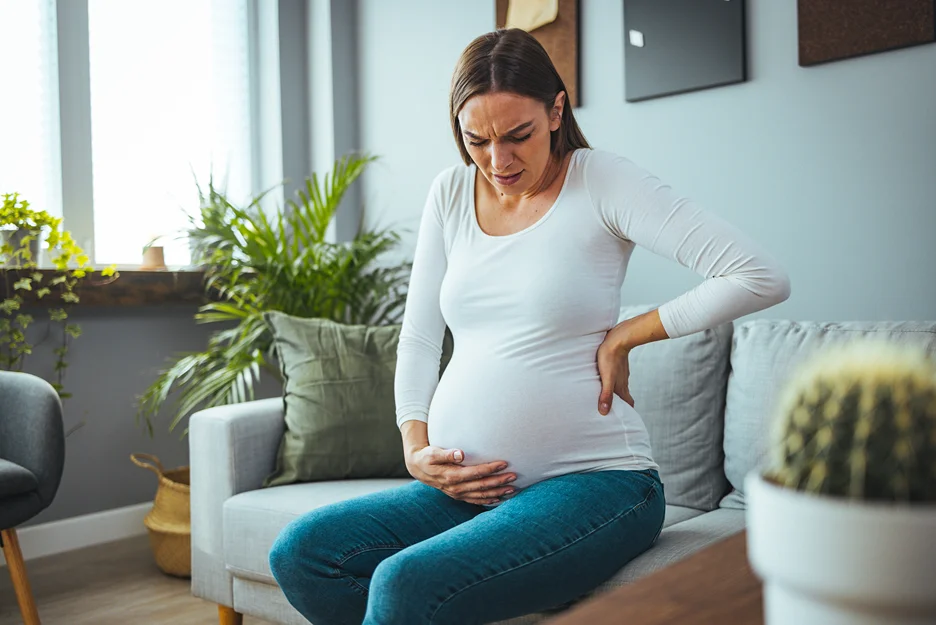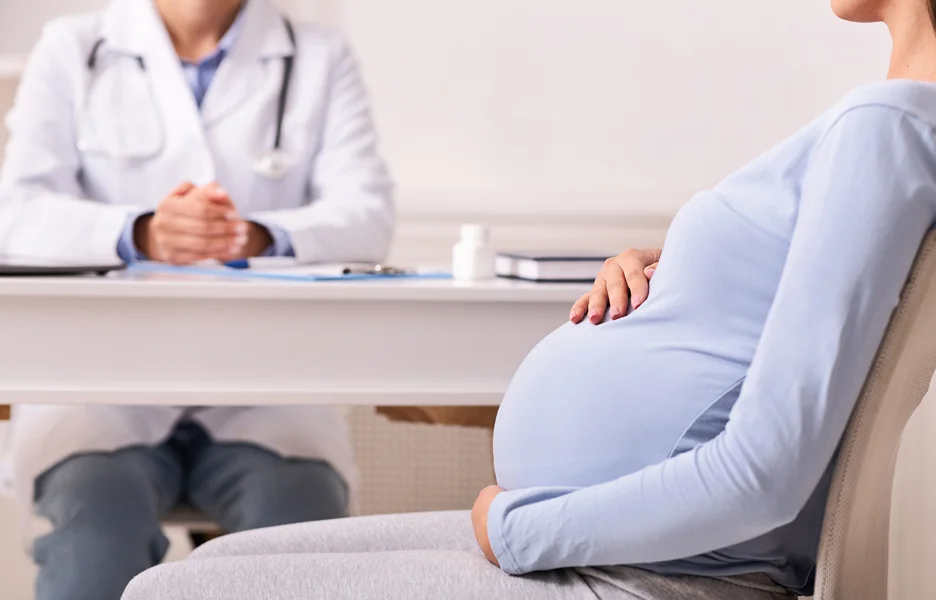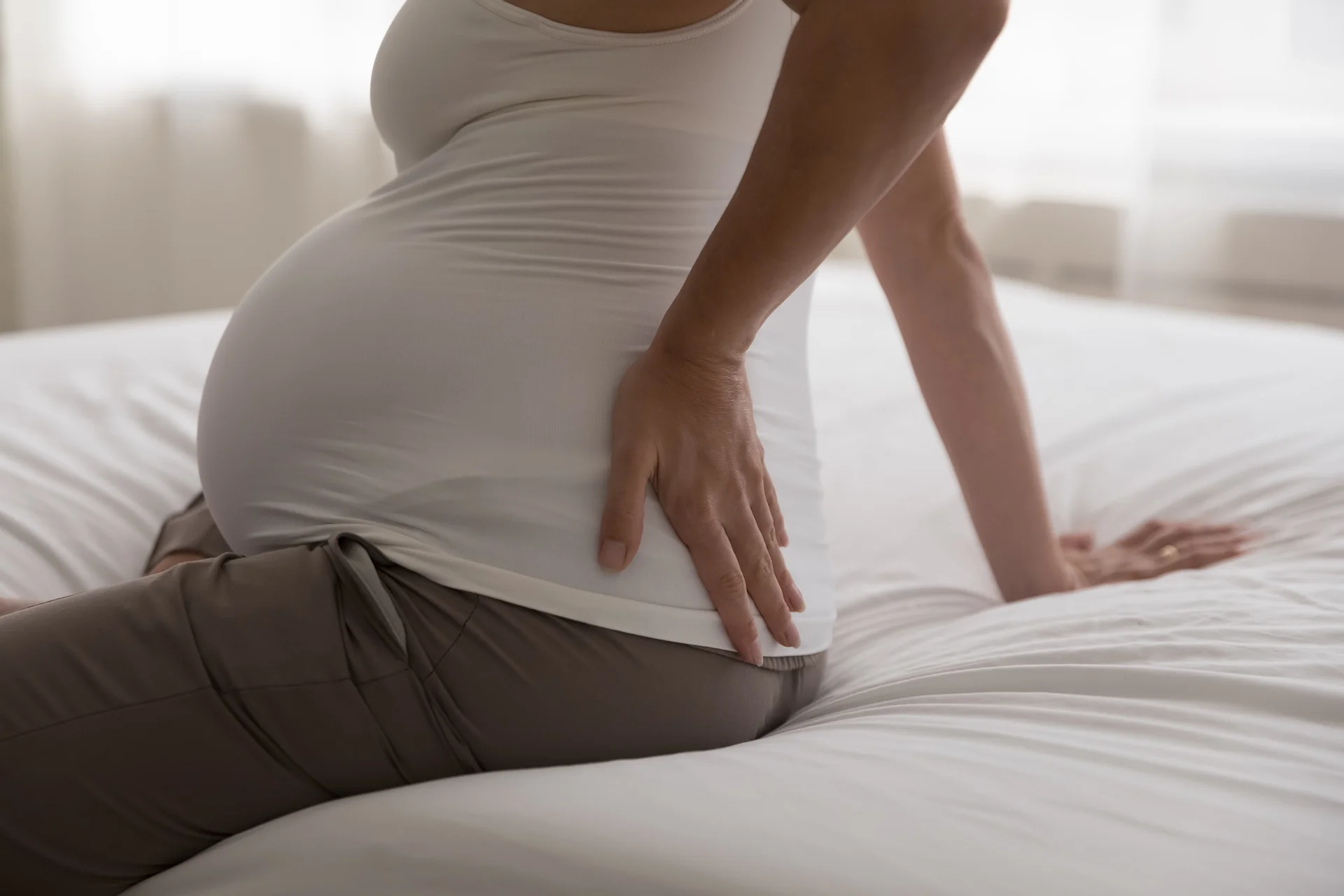If you’re pregnant, you’ve likely heard about the glow and joy that accompany this special time. Chances are, no one told you about the back pain.
Well, the reality is lower back pain during pregnancy is a common complaint. Still, it leaves many first-time moms-to-be wondering why it happens and what they can do about it.
Use this guide to explore the causes, prevention, and treatments for back pain during pregnancy and acquire the knowledge and pro tips to tackle achy days.
What Triggers Back Pain During Pregnancy?
As your pregnancy progresses, your body goes through some major changes in a relatively short period of time. These physical shifts put extra pressure and strain on your back, leading to muscle aches, nerve pain, and general discomfort.
Let’s look at some of the top culprits of pregnancy back pain:
| Cause | Explanation |
| Shifting Center of Gravity | As your belly expands, it shifts your center of gravity forward. To compensate, you arch your back, which strains the spine. |
| Hormonal Changes | Increased levels of relaxin, loosen your joints and ligaments. This instability can aggravate nerves and cause lower back pain. |
| Extra Weight | Packing on the pregnancy pounds puts extra stress on the muscles supporting your lower back and pelvis. Just 10 extra pounds adds 40 pounds of pressure on your body! |
| Posture Changes | Leaning back to offset your growing belly often leads to poor posture that taxes your lower back. |
| Baby’s Position | As your baby grows, their movement and position inside the uterus can put pressure on the surrounding nerves and pelvic region, causing pain. |
| Previous Back Problems or Injuries | Any pre-existing back conditions like arthritis, herniated discs, or old fractures can spring up during pregnancy. |
| Physical Job or Activities | Jobs or hobbies requiring heavy lifting, bending, prolonged standing, etc. can overwork the back muscles and lead to strain. |
When Does Pregnancy Back Pain Occur?
For most women, back pain begins in the later part of the second trimester, around weeks 20-28 of pregnancy – this can be earlier sometimes. As your belly expands and your hormones shift gears during this time, back strain increases.
The third trimester brings the most intense back pain, from around weeks 28-40, as weight gain is at its peak and the baby is the largest.
Finally, the last month before delivery is when many women experience lower back pain as the baby drops down into the pelvis and birth canal in preparation for labor.
However, some pregnant women experience back discomfort much earlier, starting as soon as the first trimester. This may indicate other issues like kidney problems or a UTI, so be sure to mention early back pain to your doctor.
Common Symptoms of Back Pain During Pregnancy

Pregnancy back pain differs from regular backaches in location, sensation, and severity. Here are some telltale signs that point to pregnancy as the cause:
Lower Back Pain
Most often localized to the lumbar region across the bottom of the spine. Can range from dull soreness to stabbing, sharp twinges.
Sciatica
Tingling or numbness that radiates down the back of the legs along the sciatic nerve. Usually only on one side.
Pelvic Pain
Aching or stabbing pains in the broad pelvic area that may extend down the thighs – sometimes accompanied by cramping.
Furthermore, pregnancy back pain can also stem from pelvic girdle pain (PGP) or symphysis pubis dysfunction (SPD) due to the loosening of ligaments. They may cause stiffness and uneven movement in the pelvic joints.
Hip/Tailbone Discomfort
Soreness is often concentrated in the areas of the upper hip bones and the base of the spine. Can make sitting very uncomfortable.
Rib Pain
Spasms under the rib cage are caused by the torso and hormonal changes. Feels like muscle cramps along the ribs.
Muscle Spasms
Lower back muscles contract painfully and involuntarily due to strain and fatigue.
How to Prevent Back Pain During Pregnancy
While not all back pain can be avoided during pregnancy, there are ways to minimize it with some proactive adjustments. Here are practical tips to stop back pain before it starts:
Maintain Good Posture
Stand and sit tall, aligning your head over your shoulders and pelvis. Avoid hunching or slouching.
Use Supportive Chairs
Chairs with firm, adjustable lumbar support take pressure off the lower back.
Limit Heels
Wear supportive athletic shoes or flats instead of high heels that arch the back.
Sleep Strategically
Use pillows for support between your knees, under your belly, and along the back.
Exercise Regularly
Low-impact activities like swimming, walking, and yoga strengthen back muscles without straining.
Lift Properly
Bend at the knees, hold loads close to your body, and avoid twisting when lifting objects.
Take Breaks
Short breaks to stand, stretch, and move around help minimize sitting-related back pain.
Watch Your Weight
Focus on a healthy pregnancy diet and weight gain to avoid putting extra pressure on the back.
Staying Within Safe Limits
To avoid injuring your back and overtaxing your body, follow these key recommendations from the CDC:
- Avoid lifting from below mid-shin level or above shoulder level when possible. These positions strain the back more.
- Limit lifting to no more than 10 pounds repeatedly throughout the day during pregnancy.
- Occasionally lifting between 10-20 pounds is okay if the weight is close to your body and you lift safely.
- Rarely, if ever, lift between 20-25 pounds later in pregnancy, and only with extreme caution.
- If you were a normal weight pre-pregnancy, aim to gain 25-35 pounds total.
- If overweight before pregnancy, strive for 15-25 pounds of weight gain.
- If obese prior to pregnancy, aim for 11-20 pounds gained overall.
- The CDC also recommends avoiding lifting from below mid-shin level or above shoulder level when possible, as these positions strain the back more.
Gain weight gradually over the entire pregnancy, not all at once. That’s the most important point worth remembering.
How to Manage Back Pain During Pregnancy
Even with the best prevention efforts, back pain still strikes during many pregnancies. When it hits, having effective minimization techniques is key to coping with the discomfort. Here are proven ways to get relief:
Heat Therapy
Heating pads, hot packs, warm baths, and showers soothe muscle tension and increase blood flow. Keep in mind that they should not be applied directly to the skin or for more than 15-20 minutes at a time
Cold Therapy
Ice packs, cool gel packs, and cold compresses reduce inflammation and swelling when applied for 10-15 minutes at a time.
Massage
Therapeutic prenatal massages relax muscles, boost circulation, and increase endorphins.
Stretching
Gentle stretches for the lower back, hips, and hamstrings lengthen tight muscles. Always check with your doctor before starting any new exercise routine.
Exercise
Low-impact cardio, prenatal yoga, and swimming keep muscles flexible.
Physical Therapy
Physical therapists offer specialized pregnancy exercises, joint mobilization, and other hands-on help.
Acupuncture
Fine needles stimulate nerves shown to reduce pregnancy back pain and sciatica.
Ergonomic Support
Belly bands, lumbar cushions, and pregnancy pillows take pressure off the back.
Relaxation Techniques
Learn to calm the mind by learning proven strategies like meditation, visualization, and deep breathing exercises.
Medications
Tylenol and other OTC meds provide relief as recommended by your doctor.
Chiropractic Care
Spinal adjustments realign the pelvis and treat nerve impingements. It’s best to work with a professional chiropractor with pregnancy experience.
When to See a Doctor for Pregnancy Back Pain
Most cases of back pain during pregnancy resolve on their own with a little rest and TLC. But if home remedies don’t provide relief, or your pain worsens, consult your OB-GYN or back specialist. Seek medical guidance for:
- Severe or unrelenting pain
- Numbness/tingling in legs
- Loss of bowel/bladder control
- Fever, nausea, vomiting
- Pain after an accident or fall
- Difficulty walking
Diagnosing the underlying cause will determine the proper treatment. For example, severe pain may signal issues like arthritis, disc problems, or pelvic injuries. Prompt medical care ensures you and your baby stay healthy.
The Takeaway: Your Comfort Matters

Back pain doesn’t have to be an inevitable consequence of pregnancy. Equip yourself with the right information and proactively care for your body, and it should be smooth sailing.
Give the tips above a try, but don’t hesitate to call your care provider if the pain persists. Remember, staying active and following your healthcare provider’s recommendations will carry you through the discomfort.
Learn ways to lift the strain while nurturing your bundle of joy. You’ve got this!
If you’re looking for a doctor who specializes in maternal health and relief from pregnancy pain, allow us to help you.
Connect with an OBGYN who fits your needs by using our search feature.
